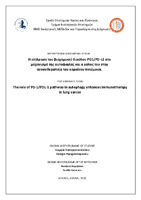| dc.contributor.advisor | Καραβάνα, Βασιλική | |
| dc.contributor.author | Παπαγιαννοπούλου, Γεωργία | |
| dc.date.accessioned | 2021-01-29T10:43:02Z | |
| dc.date.available | 2021-01-29T10:43:02Z | |
| dc.date.issued | 2021-01-25 | |
| dc.identifier.uri | https://polynoe.lib.uniwa.gr/xmlui/handle/11400/167 | |
| dc.identifier.uri | http://dx.doi.org/10.26265/polynoe-18 | |
| dc.description.abstract | Ο καρκίνος του πνεύμονα έχει το διπλό χαρακτηριστικό να είναι και συχνός και εξαιρετικά κακής πρόγνωσης. Η αντιμετώπιση του μη μικροκυτταρικού καρκίνου πνεύμονα (ΜΜΚΠ) περιλάμβανε 4 πυλώνες: χειρουργική, χημειοθεραπεία, ακτινοθεραπεία και στοχευμένη θεραπεία. Σε αυτούς πρόσφατα ήρθε να προστεθεί η ανοσοθεραπεία. Η κινητοποίηση των T-λεμφοκυττάρων κατά του όγκου, που επετεύχθη με την κατανόηση και αναστολή του μονοπατιού PD1/PD-L1, οδήγησε σε μια επαναστατική θεραπεία, με απτά αποτελέσματα και δυνατότητα συνδυασμού της με άλλες μορφές θεραπείας.
Αναστολείς του PD1, όπως το nivolumab και το pembrolizumab, και αναστολείς του PD-L1, όπως το atezolizumab και το durvalumab έχουν εισαχθεί στην κλινική πράξη και περαιτέρω φάρμακα και συνδυασμοί βρίσκονται εν εξελίξει.
Πολλά υποσχόμενη είναι επίσης η μελέτη του μηχανισμού της αυτοφαγίας στο καρκινικό κύτταρο. Η ρύθμιση του μηχανισμού αυτού μπορεί να χρησιμοποιηθεί θεραπευτικά, με τη χρήση «παλαιών» φαρμάκων, όπως η χλωροκίνη και υδροξυχλωροκίνη και φυσικών συστατικών όπως η κουρκουμίνη. Όλες αυτές οι ανακαλύψεις σηματοδοτούν μια νέα εποχή στην αντιμετώπιση του μη μικροκυτταρικού καρκίνου του πνεύμονα. | el |
| dc.format.extent | 85 | el |
| dc.language.iso | el | el |
| dc.publisher | Πανεπιστήμιο Δυτικής Αττικής | el |
| dc.rights | Αναφορά Δημιουργού - Μη Εμπορική Χρήση - Παρόμοια Διανομή 4.0 Διεθνές | * |
| dc.rights.uri | https://creativecommons.org/licenses/by-nc-sa/4.0/deed.el | * |
| dc.subject | Ανοσοθεραπεία | el |
| dc.subject | PD1 | el |
| dc.subject | PD-L1 | el |
| dc.subject | Αυτοφαγία | el |
| dc.subject | Autophagy | el |
| dc.subject | Lung cancer | el |
| dc.subject | Immunotherapy | el |
| dc.subject | Καρκίνος του πνεύμονα | |
| dc.title | Η επίδραση του βιοχημικού διαύλου PD1/PD-L1 στο μηχανισμό της αυτοφαγίας και ο ρόλος του στην ανοσοθεραπεία του καρκίνου πνεύμονα. | el |
| dc.title.alternative | The role of PD-1/PDL-1 pathway in autophagy enhances immunotherapy in lung cancer | el |
| dc.type | Μεταπτυχιακή διπλωματική εργασία | el |
| dc.contributor.committee | Θαλασσινός, Νικόλαος | |
| dc.contributor.committee | Ανθούλη-Αναγνωστοπούλου, Φραγκίσκη | |
| dc.contributor.faculty | Σχολή Επιστημών Υγείας & Πρόνοιας | el |
| dc.contributor.department | Τμήμα Βιοϊατρικών Επιστημών | el |
| dc.contributor.master | Βιοϊατρικές Μέθοδοι και Τεχνολογία στη Διάγνωση | el |
| dc.description.abstracttranslated | Lung cancer has the dual characteristics of being both common and deadly. The treatment of non small cell lung cancer has traditionally encompassed four features: surgery, chemotherapy, radiotherapy and targeted treatment. To these, immunotherapy has been recently added. The PD1/PD-L1 pathway is a major player in T-lymphocytes mobilization and tumor progression. Inhibition of both PD1/PD-L1 immune checkpoints is a particularly promising treatment approach in lung cancer. The use of standard chemotherapy combined with PD-1/PDL-1 inhibition has been proposed as a potential means of enhancing therapeutic efficacy.
PD1 inhibitors, such as nivolumab and pembrolizumab, and PD-L1 inhibitors, such as atezolizumab and durvalumab are currently in clinical use. Numerous PD-1 and PD-L1 blocking antibodies are under development, each aiming to facilitate a vigorous and sustained anti-tumor immune response in patients with advanced lung cancer.
Autophagy as a form of programmed cell death participates in the pathogenesis, development and progression of lung cancer. The utilization of this pathway can be used therapeutically, in combination with “old” drugs, such as chloroquine and hydroxychloroquine, or natural ingredients such as curcumin. Therefore the new therapeutic developments mark a new era in non small cell lung cancer treatment. | el |


